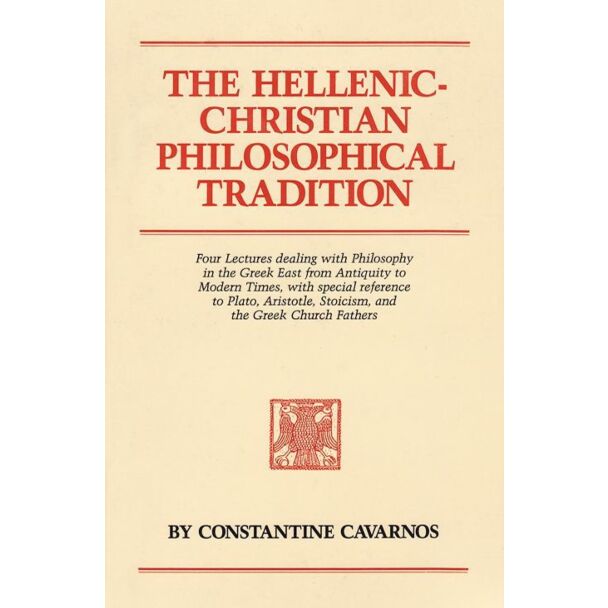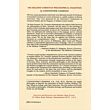The Hellenic-Christian Philosophical Tradition
by Constantine Cavarnos
With an Introduction by Professor Stephen D. Salamone
With an Introduction by Professor Stephen D. Salamone
The Hellenic-Christian Philosophical Tradition: Four Lectures delivered at Boston University. An original discussion of the Legacy of Socrates, Plato and Aristotle in the Hellenic East from ancient to modern times, of Stoic elements in the Greek Church Fathers, and of the Concept of Philosophy in ancient Greece, Byzantium, and modern Greece.
Publication Data: Belmont, MA: Institute for Byzantine and Modern Greek Studies, 2004
Format: softcover
Number of Pages: x + 127
Dimensions (l × w × h): 21.5 cm × 14.1 cm × 1.0 cm
ISBN: 0‒914744‒84‒4
by Constantine Cavarnos
With an Introduction by Professor Stephen D. Salamone
“The present essays were first delivered by Dr. Constantine Cavarnos as a series of lectures with the title The Hellenic Philosophical Continuum to a public audience at Boston University during the Spring Semester of 1986–87. They were sponsored by the Department of Classical Studies and its Program in Modern Greek Studies. These lectures were specifically composed by Dr. Cavarnos for our series. And they provide further evidence that modern Greek studies and classical studies are inherently related disciplines requiring, on occasion at least, a unified expression of their shared essence.”
—“INTRODUCTION: THE HELLENIC CONTINUUM”
CONTENTS
PREFACE
INTRODUCTION BY PROFESSOR S. D. SALAMONE, Ph.D.
The Question of the Hellenic Continuum, Classical Greek Paideia: Eastern and Western Perspectives, Greek-Orthodox Christianity and Modern Greek Identity, Essentialist Approach
LECTURE ONE
PLATO’S LEGACY IN THE HELLENIC EAST
1. The Sensible Realm and the Intelligible Realm, 2. God as Demiougós, 3. View of the Human Soul, 4. The Four General Virtues, 5. Unity of the Virtues, 6. The Virtues as Beautiful
LECTURE TWO
ARISTOTLE’S LEGACY IN THE HELLENIC EAST
1. The Distinction between Matter and Form, 2. The Notion of Immaterial Being, 3. The Conception of God, 4. The Ten Categories, 5. The Theory of Moral Excellence or Virtue
LECTURE THREE
STOIC ELEMENTS IN THE GREEK CHURCH FATHERS
1. The Governing Principle, 2. Preconceptions, 3. Examining the Phantasies, 4. Assent and Refusal of Assent, 5. Relation, 6. Tranquillity, 7. Passionlessness
LECTURE FOUR
THE CONCEPT OF PHILOSOPHY IN THE HELLENIC TRADITION
The Term “Philosophy” in the Pre-Christian Times, 1. Philosophy as Love of Wisdom, 2. Philosophy as “Meléte Thanátou,” 3. Philosophy as Self-examination and Cross-examination, 4. Philosophy as Dialectic, 5. Philosophy as the Way of the Best Life, 6–10. Philosophy as Organized Knowledge in General, and Four Divisions of It
The Term “Philosophy” in the Christian Period, 1. Philosophy as the Love of Wisdom, 2. Philosophy as Meléte Thanátou, 3. Philosophy as Élenchos, 4. Philosophy as Dialectic, 5. Philosophy as the Way of the Best Life, 6–10. The Five Aristotelian Senses of the Term “Philosophy”
Six Special Christian Uses of the Term “Philosophy,” 1–2. External Philosophy and Internal Philosophy, 3. Orthodox Christian Teaching as Philosophy, 4. Lived Christian Teaching as Philosophy, 5. The Practices of Inner Attention and Inner Quiet as Philosophy, 6. The Monastic Way of Life as Philosophy
Conclusion
INDEX OF PROPER NAMES
INDEX OF SUBJECTS
Publication Data: Belmont, MA: Institute for Byzantine and Modern Greek Studies, 2004
Format: softcover
Number of Pages: x + 127
Dimensions (l × w × h): 21.5 cm × 14.1 cm × 1.0 cm
ISBN: 0‒914744‒84‒4
by Constantine Cavarnos
With an Introduction by Professor Stephen D. Salamone
“The present essays were first delivered by Dr. Constantine Cavarnos as a series of lectures with the title The Hellenic Philosophical Continuum to a public audience at Boston University during the Spring Semester of 1986–87. They were sponsored by the Department of Classical Studies and its Program in Modern Greek Studies. These lectures were specifically composed by Dr. Cavarnos for our series. And they provide further evidence that modern Greek studies and classical studies are inherently related disciplines requiring, on occasion at least, a unified expression of their shared essence.”
—“INTRODUCTION: THE HELLENIC CONTINUUM”
CONTENTS
PREFACE
INTRODUCTION BY PROFESSOR S. D. SALAMONE, Ph.D.
The Question of the Hellenic Continuum, Classical Greek Paideia: Eastern and Western Perspectives, Greek-Orthodox Christianity and Modern Greek Identity, Essentialist Approach
LECTURE ONE
PLATO’S LEGACY IN THE HELLENIC EAST
1. The Sensible Realm and the Intelligible Realm, 2. God as Demiougós, 3. View of the Human Soul, 4. The Four General Virtues, 5. Unity of the Virtues, 6. The Virtues as Beautiful
LECTURE TWO
ARISTOTLE’S LEGACY IN THE HELLENIC EAST
1. The Distinction between Matter and Form, 2. The Notion of Immaterial Being, 3. The Conception of God, 4. The Ten Categories, 5. The Theory of Moral Excellence or Virtue
LECTURE THREE
STOIC ELEMENTS IN THE GREEK CHURCH FATHERS
1. The Governing Principle, 2. Preconceptions, 3. Examining the Phantasies, 4. Assent and Refusal of Assent, 5. Relation, 6. Tranquillity, 7. Passionlessness
LECTURE FOUR
THE CONCEPT OF PHILOSOPHY IN THE HELLENIC TRADITION
The Term “Philosophy” in the Pre-Christian Times, 1. Philosophy as Love of Wisdom, 2. Philosophy as “Meléte Thanátou,” 3. Philosophy as Self-examination and Cross-examination, 4. Philosophy as Dialectic, 5. Philosophy as the Way of the Best Life, 6–10. Philosophy as Organized Knowledge in General, and Four Divisions of It
The Term “Philosophy” in the Christian Period, 1. Philosophy as the Love of Wisdom, 2. Philosophy as Meléte Thanátou, 3. Philosophy as Élenchos, 4. Philosophy as Dialectic, 5. Philosophy as the Way of the Best Life, 6–10. The Five Aristotelian Senses of the Term “Philosophy”
Six Special Christian Uses of the Term “Philosophy,” 1–2. External Philosophy and Internal Philosophy, 3. Orthodox Christian Teaching as Philosophy, 4. Lived Christian Teaching as Philosophy, 5. The Practices of Inner Attention and Inner Quiet as Philosophy, 6. The Monastic Way of Life as Philosophy
Conclusion
INDEX OF PROPER NAMES
INDEX OF SUBJECTS
Write Your Own Review






